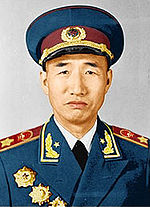Xu Xiangqian, Date of Birth, Place of Birth, Date of Death
TweetXu Xiangqian
Chinese politician and field marshalAbout Xu Xiangqian
- Xu Xiangqian (November 8, 1901 – September 21, 1990) was a Chinese Communist military leader and one of the Ten Marshals of the People's Liberation Army.
- He was the son of a wealthy landowner, but joined Chiang Kai-shek's National Revolutionary Army, against his parents' wishes, in 1924.
- When the Kuomintang began to fight the Communists in 1927, Xu left Chiang's forces and led a Communist army based in Sichuan under the political authority of Zhang Guotao.
- After Zhang was purged in the early 1930s, Xu survived politically and rejoined the Red Army, in a less senior position, under the leadership of Mao Zedong. During the Second Sino-Japanese War (1937-1945) Xu served in several military units in Communist-controlled areas across North China, and directed the construction of several bases areas.
- When the Chinese Civil War resumed, in 1947, Xu was active in North China.
- Forces under his command were responsible for the capture of the heavily fortified city of Taiyuan in the later stages of the war, in 1949. After the establishment of the People's Republic of China in 1949, Xu was recognized as one of China's "Ten Marshals".
- He held numerous political and military positions, and survived the Cultural Revolution despite attempting to moderate some of its more destructive effects.
- He was an important supporter of Deng Xiaoping and his return to political power in 1976.
- He continued to serve in a number of political and military positions until he was forced to retire in 1985.
Read more at Wikipedia


 Date of Birth:
Date of Birth:  Place of Birth: Wutai County, Shanxi, China
Place of Birth: Wutai County, Shanxi, China